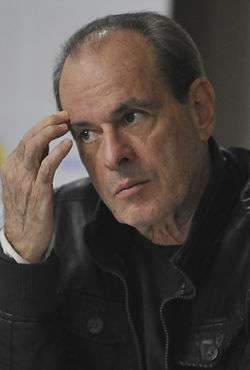Ney Matogrosso
| Ney Matogrosso | |
|---|---|
|
Ney Matogrosso in 2011 | |
| Background information | |
| Birth name | Ney de Sousa Pereira |
| Born |
August 1, 1941 Bela Vista, Mato Grosso do Sul, Brazil |
| Genres | MPB, folk rock, pop rock, glam rock |
| Occupation(s) | Singer, music producer |
| Instruments | Singer |
| Years active | 1971–present |
| Associated acts | Secos & Molhados |
Ney de Souza Pereira, known as Ney Matogrosso (Portuguese pronunciation: [ˈnej matoˈɡɾosu]; born August 1, 1941, in Bela Vista, Mato Grosso do Sul), is a Brazilian singer who is distinguished for his uncommon countertenor voice. He was ranked by Rolling Stone as the third greatest Brazilian singer of all time, and by the same magazine as the 31st greatest Brazilian music artist of all time.[1]
Biography
Matogrosso enlisted in the Brazilian Air Force at the age of 17, being later transferred to Brasília. Within a few years, Matogrosso started singing in a vocal quartet, performing at college festivals throughout Brazil. With the hope of becoming a stage actor, Ney moved to Rio de Janeiro in 1966, where he lived as a hippie and made ends meet by selling arts and crafts. In 1971, he moved to São Paulo, adopting the artistic name Ney Matogrosso, and joined the glam rock group Secos & Molhados, which in less than 18 months became a phenomenon, selling 1 million records. Endowed with a unique counter-tenor voice and a striking stage presence, Ney’s career soared.
After the group Secos e Molhados split up, Ney pursued a successful solo career in Brazil and abroad, obtaining several Gold and Platinum records.
Famous for his outlandish costumes, make-up, daring movements and singular high-pitched voice, Ney has always been regarded as a controversial character. One of his greatest hits was the song "Homem com H" (by Antônio Barros).
In the 1970s he released albums that were very important for his career: "Pecado", "Bandido", "Feitiço" and "Seu Tipo". In that period, Ney toured round United States, Argentina, Uruguay, Europe and Israel, performing hits like "América do Sul" (Paulo Machado), "Bandolero" (Lucinha) and "Não Existe Pecado ao Sul do Equador" (Chico Buarque/ Rui Guerra). In the 1980s, Ney recorded "Por Debaixo dos Panos" (Ceceu), "Tanto Amar" (Chico Buarque), "Ando Meio Desligado" (Mutantes), "Sangue Latino" (João Ricardo/ Paulo Mendonça) and "Vereda Tropical" (Gonzalo Curiel).
In 1986, Matogrosso performed for the first time without wearing fancy costumes, adopting a low-key image. Since then, he has focused on his work as a singer, recording from the traditional repertoire of MPB (Música popular brasileira — the so-called Brazilian pop music genre). Recordings in this genre first appeared on the album "O Pescador de Pérolas" (1986), which featured "O Mundo É um Moinho" (Cartola), "Dora" (Dorival Caymmi), "Da Cor do Pecado" (Bororó) and "Aquarela do Brasil" (Ary Barroso).
Ney toured with guitarist Raphael Rabello, with whom he recorded the album "À Flor da Pele" in 1990. Then, he made two albums as a tribute to Brazilian performers/songwriters, like Ângela Maria ("Estava Escrito", 1994) and Chico Buarque ("Um Brasileiro", 1996).
Discography
Albums
- Água do Céu-Pássaro, also known as Homem de Neanderthal (1975)
- Bandido (1976)
- Pecado (1977)
- Feitiço (1978)
- Seu Tipo (1979)
- Sujeito Estranho (1980)
- Ney Matogrosso (1981)
- Mato Grosso (1982)
- ...Pois É (1983)
- Destino de Aventureiro (1984)
- Bugre (1986)
- Pescador de Pérolas (1987)
- Quem Não Vive Tem Medo da Morte (1988)
- Ney Matogrosso Ao Vivo (1989)
- À Flor da Pele (1990) - with Raphael Rabello
- As Aparências Enganam (1993) - with Aquarela Carioca
- Estava Escrito (1994)
- Um Brasileiro (1996)
- O Cair da Tarde (1997)
- Olhos de Farol (1999)
- Vivo (2000)
- Batuque (2001)
- Ney Matogrosso Interpreta Cartola (2002)
- Ney Matogrosso Interpreta Cartola Ao Vivo (2003)
- Vagabundo (2004) - with Pedro Luís e a Parede
- Canto em Qualquer Canto (2005)
- Vagabundo ao vivo(2005) - with Pedro Luís e a Parede
- Atento aos sinais (2013)
Extras
- A FLORESTA DO AMAZONAS - VILLA-LOBOS 1988
- BRAZIL NIGHT - AO VIVO EM MONTREUX - CAETANO VELOSO, JOÃO BOSCO E NEY MATOGROSSO 1983
Compilations
- VINTE E CINCO 1996
- JUNTOS - NEY MATOGROSSO e SECOS & MOLHADOS
Appearances
- Secos e Molhados (1973)
- Secos e Molhados (1974)
- GRAVADO AO VIVO NO MARACANÃZINHO (1980)
| Wikiquote has quotations related to: Ney Matogrosso |
References
- ↑ http://www.allmusic.com/artist/p11145/biography AllMusic. Retrieved on July 17, 2010.
